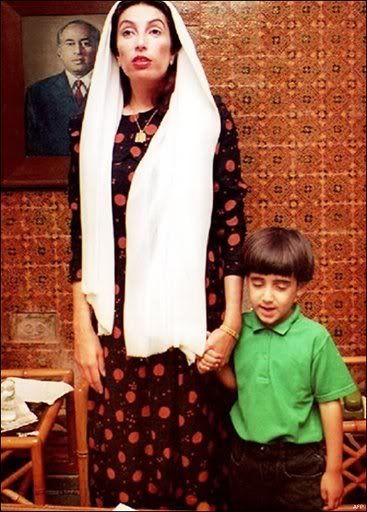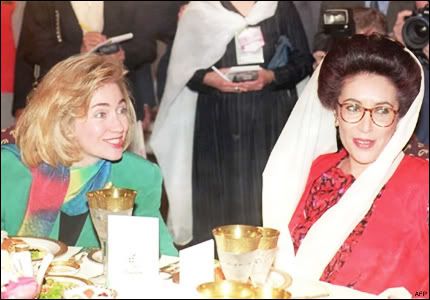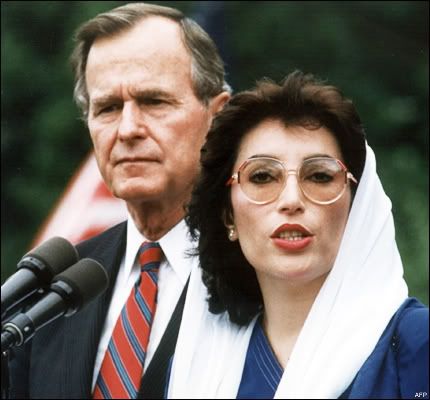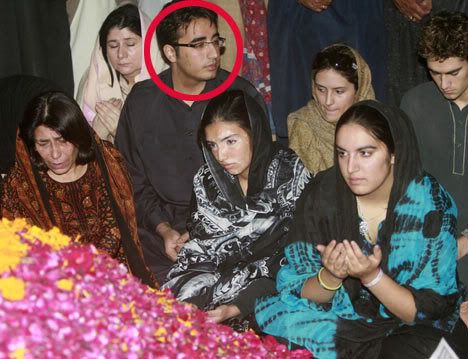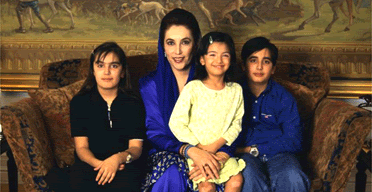The U.S. has given billions of dollars to Musharraf's military for training and eradication of terrorists from hideouts in Pakistan. It was Condoleeza Rice and John Negroponte who brokered the deal with Musharraf for Benazir Bhutto's return to Pakistan. If U.S. policy in our 'war on terror' depends on Bhutto's participation in Pakistan's election for Prime Minister, who would put Bhutto into Pakistan without beefy security in place before she even landed? And who would let her stay without even beefier-than-beefed-up security after the attempt on her life once she arrived in Pakistan on October 18, 2007?
The Washington Times reports:
Benazir Bhutto was so fearful for her life that she tried to hire British and American security firms, including Blackwater, to protect her, but Pakistani President Pervez Musharraf refused to allow the foreign contractors to operate in Pakistan, her aides said.
"She asked to bring in trained security personnel from abroad," said Mark Siegel, her U.S. representative. "In fact, she and her husband repeatedly tried to get visas for such protection, but they were denied by the government of Pakistan."
Her entourage discussed deals with North Carolina-based Blackwater Corp., sources said.
"We were approached to provide [former] Prime Minister Bhutto's security, but an agreement was unfortunately never reached," a Blackwater spokeswoman said, confirming the negotiations. She declined to go into the precise details.
Sources within the British private security industry said she also had negotiations with the London-based firm Armor Group, which guards British diplomats in the Middle East. The company, however, said last night it had no knowledge of any talks.In addition to private contractors, the U.S. State Department also provides protection for foreign dignitaries around the world through its Bureau of Diplomatic Security.
Mrs. Bhutto frantically contacted officials, diplomats and friends in the United States, Europe and the Persian Gulf to urge Mr. Musharraf to improve her security in the wake of the suicide bomb attack that killed more than 140 during her homecoming parade on Oct 18.
Indeed, U.S. diplomats took the highly unusual step of providing her directly with confidential U.S. intelligence about terrorist threats to her life, knowledgeable sources said. Pakistan's Interior Ministry also passed on details of plots against her, and aides said letters containing death threats had been smuggled into her home.
Husain Haqqani, a U.S.-based Bhutto adviser, director of the Center for International Relations and a professor at Boston University, confirmed that she wanted to use private international security contractors but said the Musharraf regime would not approve the plan.
He said the United States, which has arranged for private contractors to guard Afghan President Hamid Karzai and top leaders in Iraq, was reluctant to pressure Mr. Musharraf, an ally in the war on terrorism, to change his mind, despite the view that U.S. officials considered Mrs. Bhutto a linchpin in their crucial diplomatic bid to encourage Pakistan to return to democracy.
After enough blunders, you start to wonder if the blunders weren't the 'hoped for' outcome that the Bush administration had intended all along.Afghan President Hamid Karzai, center, is surrounded by Diplomatic Security special agents as he arrives for a groundbreaking ceremony in Parwan, some 34 miles north of Kabul. The groundbreaking ceremony celebrated a road linking the Panjshir Valley to Parwan in the district of Bayan.
At the invitation of Liberian President-elect Ellen Johnson-Sirleaf, the Diplomatic Security Service is providing temporary assistance with security and training for her Liberian protective detail.
A Diplomatic Security special agent assigned to a Mobile Security Deployment team stands guard outside Palestinian Prime Minister Ahmed Qureia's office as Prime Minister Qureia meets with Secretary of State Condoleezza Rice in the West Bank town of Ramallah
Officials from Mrs. Bhutto's Pakistan Peoples Party have complained that security arrangements for her were woefully inadequate, given the seriousness of the threats against her from al Qaeda, the Taliban and others. She relied largely on using a "human shield" of loyal followers who would form a ring around her, but as the attack Thursday proved, it was little protection against a determined assailant.
Some security industry specialists have suggested, however, that there may have been other reasons why the help of foreign security firms was not enlisted.
To be surrounded by an entourage of foreign bodyguards would have added to criticisms that Mrs. Bhutto was in the pocket of the West — an accusation leveled at Mr. Karzai — and might not have been welcomed by her own Pakistani security staff. But the firms could have taken a background role as consultants and trained locals in bodyguarding techniques to maintain a Pakistani face to her entourage.
"It's odd and disturbing that the Pakistan government did not do a better job of protecting her and that the U.S. apparently could not do more to persuade them," said Bruce Riedel, a former CIA officer and former National Security Council director for South Asia. "She made it very clear privately and publicly that she did not have enough security. That was abundantly clear after the attack on her return."
Nobody is this incompetent and left in place by a Congress unless it's serving the purpose of the powerful elite machine behind them all. And democracy is the last thing that those in power want to take hold across the globe.

